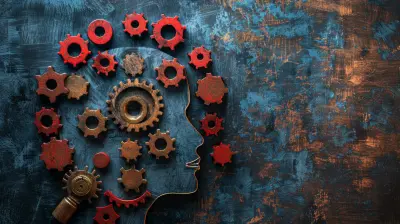Overcoming Judgment: How to Be an Ally in the Fight Against Mental Health Stigma
17 September 2025
Mental health stigma—ugh, where do we even begin? It’s like that one toxic ex who just won’t get the hint and leave. It lingers, whispers nonsense in people's ears, and convinces them that struggling with mental health is some kind of weakness. Spoiler alert: It’s not.
But here’s the good news—you don’t have to sit around and watch stigma do its dirty work. You can step up, speak out, and be a fierce ally in the fight against mental health discrimination. Ready to smash the stereotypes and raise awareness? Let’s get into it.

What Even Is Mental Health Stigma?
First things first—what’s all the fuss about stigma? Basically, it’s society’s habit of treating mental health issues like a dirty little secret. It’s the eye-rolls when someone mentions therapy, the hushed whispers about "crazy" relatives, and the job rejections because someone had the audacity to admit they struggle with anxiety.There are two main types of stigma:
- Social stigma: This is the judgment and discrimination from the world around us—friends, coworkers, even family. It’s the side-eyes, the insensitive jokes, the "just get over it" comments.
- Self-stigma: This happens when people internalize all that external nonsense and start believing they’re broken or unworthy. It can keep folks from seeking help, accessing treatment, or even admitting they’re struggling.
Neither of these is okay. And if our goal is a mentally healthier society, dismantling stigma is non-negotiable.

Why Mental Health Stigma Needs to Die—Like, Yesterday
Stigma isn’t just annoying; it’s straight-up harmful. When people fear judgment, they stop reaching out for help. And when they don’t get help, struggles worsen. The result? Higher rates of untreated mental illness, unnecessary suffering, and—worst-case scenario—lives lost too soon.The numbers don’t lie:
- According to the World Health Organization, nearly 1 in 4 people will experience a mental health disorder at some point in their lives.
- More than half of those individuals won’t seek treatment—often because of stigma.
- Suicide remains a leading cause of death worldwide, and stigma around mental health plays a huge role in preventing people from getting the support they need.
It doesn’t take a genius to see that stigma is a killer. So let's talk about how you can help shut it down for good.

How to Be an Ally and Actually Make a Difference
Being an ally isn’t just some trendy title—it’s a commitment. It’s about stepping up, challenging harmful narratives, and making space for real conversations around mental health. Here’s how to do it like a pro:1. Check Your Own Biases (Yes, You Have Them)
Before you go saving the world, take a sec to look inward. We all have biases—some conscious, some lurking beneath the surface. Ask yourself:- Do I automatically assume people with mental illness are dangerous or unstable?
- Have I ever dismissed someone’s struggles as “just an excuse”?
- Do I treat mental health differently than physical health?
If any of these made you squirm, congrats—you’re human. The key is recognizing these biases and actively working to unlearn them.
2. Stop Using Harmful Language
Words matter. And let’s be real—society loves throwing around words that are straight-up toxic to mental health conversations.- Saying “They’re so bipolar” when someone’s just being moody? Nope.
- Calling yourself “OCD” because you like things neat? Also nope.
- Saying “Just be positive” to someone with depression? Big nope.
Instead, use language that’s respectful and stigma-free. Say “They have bipolar disorder” instead of labeling someone as it. A little mindfulness in speech goes a long way.
3. Support, Don’t Pity
Nobody wants to be treated like a charity case. People with mental health conditions aren’t “scary” or “broken”—they’re just people navigating life with a few extra challenges.So instead of an “Aww, poor you” approach, try:
✔ “I’m here for you—whatever you need.”
✔ “Do you want to talk about what’s going on?”
✔ “You are not alone in this.”
See the difference? Support > sympathy. Always.
4. Challenge Stigma When You See It
Got a coworker cracking jokes about “psychos” or a friend who insists “therapy is for the weak”? Time to step in.You don’t need to start a full-blown argument, but call it out. A simple “Actually, that’s not true—mental illness is just as real as physical illness” can plant a seed of change.
And if you're feeling bold? Drop some stats. Educating people (without shaming them) is a game-changer.
5. Share Your Own Story (If You’re Comfortable)
You know what shuts down stigma fast? Real-life stories. When people see that mental health struggles aren’t just abstract ideas but issues affecting their friends, coworkers, and family members, it humanizes the experience.If you have your own mental health journey, sharing it (even in small ways) can be incredibly powerful. Of course, do only what feels safe and comfortable for you. Your story is yours to tell—on your terms.
6. Support Mental Health Advocacy and Policies
Want to make an even bigger impact? Get involved in actual change-making efforts.- Support policies that promote affordable therapy and mental health care.
- Donate to mental health organizations doing important work.
- Advocate for mental health education in schools and workplaces.
Change isn’t just about conversations—it’s also about action.
7. Encourage People to Get Help Without Shame
If someone opens up about struggling, your job isn’t to fix them—it’s to support them. Encourage professional help without making them feel broken for needing it.Try saying:
✔ "Therapy is literally a gym for your mind—nothing weak about it."
✔ "You deserve support just as much as anyone with a physical illness."
Make getting help feel normal, not taboo.

Final Thoughts: Stigma Has No Place Here
Stigma is outdated, harmful, and honestly? Boring. We don’t need it. What we do need is open conversations, real support, and a society that treats mental health like the crucial issue it is.Your voice matters in this fight. Whether it’s shutting down stereotypes, advocating for mental health rights, or simply being there for a friend in need, every action counts.
So go ahead—be the ally who helps make this world just a little bit better. Mental health deserves it. And so do the people who struggle with it.
all images in this post were generated using AI tools
Category:
Mental Health StigmaAuthor:

Ember Forbes
Discussion
rate this article
1 comments
Otis McKeever
Thank you for shedding light on such an important topic. Together, we can create a more compassionate world where mental health struggles are met with understanding and support.
October 10, 2025 at 5:01 PM

Ember Forbes
Thank you for your thoughtful response! Together, we can indeed foster understanding and support for mental health.


